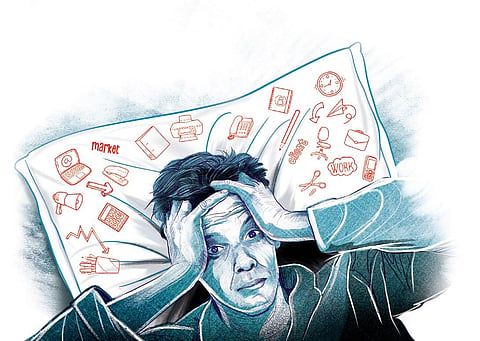

BENGALURU: The ongoing lockdown has turned life upside down for many. Working from home has led to a loss of regular routine as the line between work and home, day and night becomes a blur. Take, for instance, Lokesh Sanghi, who recently turned nocturnal. Usually, the 23-year-old student would wake up at 5am to work out at Cubbon Park, but he is currently unable to do that.
“Back then, sleeping at 12am was late for me. Now, even 4am isn’t,” he says. But he isn’t alone. According to a recent study by Wakefit.co, a city-based sleep solutions company, 67 per cent of the 1,500 respondents across India reported that working from home has altered their sleep schedule. “There’s been an increase from 25 to 35 per cent in the number of people sleeping post midnight,” says Chaitanya Ramalingegowda, co-founder and director, Wakefit.co. And the consequences of this can be dire, warn city-based health experts.
“The window between 11pm and 4am is considered to be vital since the body rejuvenates all organs during this time. Lack of sleep can affect one’s immune system and with COVID-19 around, one really needs to keep their immunity high,” says Dr Babina Nanda, chief medical officer at Jindal Naturecure Institute. Agrees Dr Pavan Yadav, consultant, pulmonology and sleep medicine at Aster RV Hospital. He explains how the sleep-wake cycle is controlled by a hormone called melatonin. Due to lockdown people are spending more time on social media or watching news on television / devices. “The light emitting interfaces from devices confuse the brain and delay melatonin release, thereby affecting sleep onset,” he says.
A simple fix, suggest doctors, would be turning off all devices and gadgets an hour before bedtime. While pushing back your snooze hour from 4am to 11pm seems drastic at first, Ramalingegowda insists that a gradual change is possible. “You could try listening to some sleep or ASMR playlists, which have relaxing ambient sounds like that of rain, water or plain white noise,” he suggests.
Dr Kapur B, consultant, psychiatry at Columbia Asia Hospital, Hebbal, attends to 7-8 cases a day where patients complain of sleep issues. “Regular exercises like yoga, especially pranayama, can really help,” he says. Agrees Nanda, who adds that one needs to soak in at least 10-15 minutes of sunlight a day, so as to help the body distinguish between light and dark. “Cut back on naps and soak your feet in hot water 15 minutes before bedtime. Initially, it may be tough to turn the clock around but persistence is key.”
Another fix, suggests Ramalingegowda, is to not use one’s bedroom as the designated work space during the day. “This leads to your brain picking up subtle cues, asking it to be alert instead of relaxing,” he explains. For those who have no option but to use their bedroom, a change of environment will be helpful. “Light a lavender incense stick or candle and clear the space of all gadgets. You could also have an early dinner at 8pm and sip some chamomile tea at 9pm to relax your mind,” he adds.